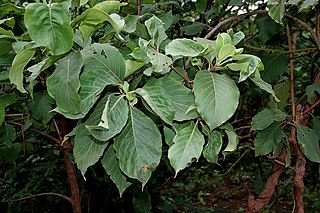
Cassia is a genus of flowering plants in the legume family, Fabaceae, and the subfamily Caesalpinioideae. Species are known commonly as cassias. The genus includes 37 species and has a pantropical distribution. Species of the genera Senna and Chamaecrista were previously included in Cassia. Cassia now generally includes the largest species of the legume subtribe Cassiinae, usually mid-sized to tall trees.

Conyza is a genus of flowering plants in the family Asteraceae.

Pentas is a genus of flowering plants in the family Rubiaceae. The genus is found in tropical and southern Africa, the Comoros, Madagascar, and the Arabian Peninsula.

Distephanus is a genus of flowering plants in the family Asteraceae. It is described by American botanist Harold E. Robinson as having over 40 species and by David Mabberley as having only 34 species. These sources differ sharply in their description of the range of the genus. Robinson has it ranging throughout Africa and occurring also in India and China. Mabberley has it restricted to southeast Africa, Madagascar, and Mauritius.

Pluchea is a genus of flowering plants in the tribe Inuleae within the family Asteraceae. Members of this genus might be known as camphorweeds, plucheas, or less uniquely fleabanes. Some, such as P. carolinensis and P. odorata, are called sourbushes. There are plants of many forms, from annual and perennial herbs to shrubs and trees, and there is variation in the morphology of leaves, flowers, and fruits.

Campylospermum is a genus of plants in the family Ochnaceae.

Utricularia arenaria is a small annual carnivorous plant that belongs to the genus Utricularia. It is native to tropical and southern Africa, where it can be found in Angola, Burundi, Cameroon, Côte d'Ivoire, the Democratic Republic of the Congo, Ethiopia, Gabon, Ghana, Kenya, Madagascar, Malawi, Mali, Mozambique, Nigeria, Senegal, Sierra Leone, South Africa, Sudan, Tanzania, Togo, Uganda, Zambia, and Zimbabwe. There has also been a single collection from central India in Madhya Pradesh. U. arenaria grows as a terrestrial plant in damp, sandy or peaty soils in swampy grasslands or marshes at altitudes from near sea level to 2,400 m (7,874 ft). It was originally described and published by Alphonse Pyrame de Candolle in 1844.
Stomatanthes is a genus of African and South American plants in the tribe Eupatorieae within the family Asteraceae.

Melanthera, is a genus of perennial flowering plants in the family Asteraceae, native to North and South America, as well as Africa, Asia and Oceania, including Hawaiʻi.

Hymenodictyon is a genus of flowering plants in the family Rubiaceae. It has about 30 species. All are native to the Old World. The wood of Hymenodictyon orixense is soft and has limited use, mostly for boxes. The type species for Hymenodictyon is Hymenodictyon orixense.
Baccharoides is a genus of Asian and African plants in the tribe Vernonieae within the family Asteraceae.
Brenandendron is a genus of plants in the family Asteraceae, native to tropical Africa. The genus is named for the British botanist John Patrick Micklethwait Brenan and its species were formerly placed in the genus Vernonia.
Orbivestus is a genus of shrubs in the family Asteraceae, native to tropical Africa, the Arabian Peninsula and the Indian subcontinent. Its species were formerly placed in the genus Vernonia.
Oocephala is a genus of plants in the family Asteraceae, native to Africa. The name means "egghead", referring to the egg-shaped capitulum, which distinguishes the genus from its close relative Polydora. Some species were formerly placed in the genus Vernonia.
Parapolydora is a genus of flowering plants belonging to the family Asteraceae.
Libinhania is a genus of flowering plant in the family Asteraceae, native to Somalia and Socotra. The genus was established in 2017, as a result of a molecular phylogenetic study, which showed that a number of species endemic to Socotra, some of which had been placed in the genus Helichrysum, formed a clade that did not belong in that genus.










